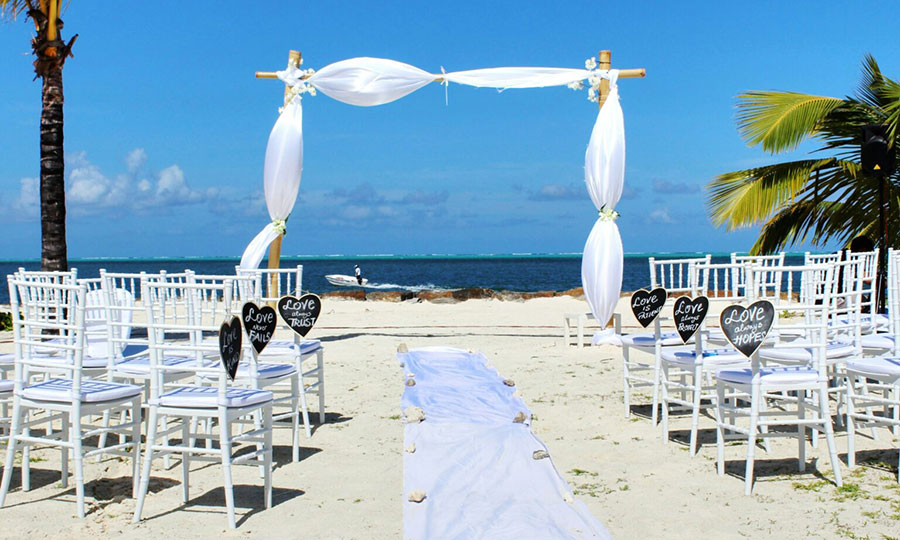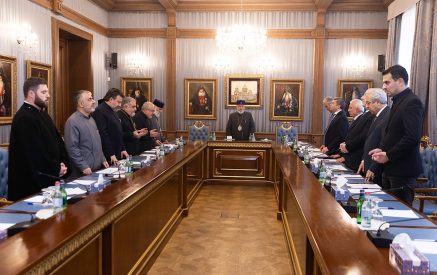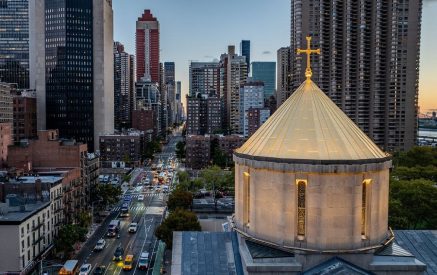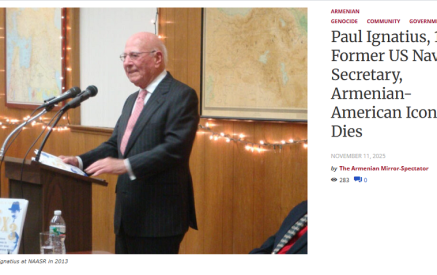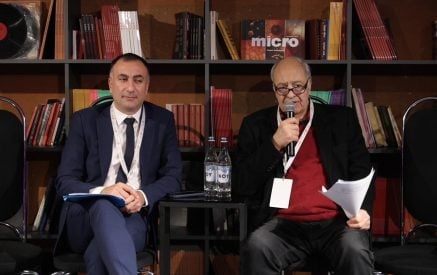As Armenians in the western diaspora, we live unique lives. Our existence as a distinct and active ethnic group should never be taken for granted. Most groups that immigrated to the United States during the early 20th century have generally assimilated in terms of functioning as a community. Armenians immigrants followed the patterns of other ethnic groups and initially settled in neighborhoods. When generational prosperity diluted Armenian neighborhoods in most communities, the identity structure still continued. Assimilation patterns usually accelerate when community density dissipates.
When Armenians came to this country, they built churches and established communities with their faith as a foundation. Despite significant changes in the Armenian diaspora over the last several decades, the Armenian church remains the most influential and unifying (in the sense of commonality) institution in our diaspora. The history of the Armenian people over the last two millennia has been closely integrated with a church that functions far beyond its primary purpose of spiritual nourishment.
For centuries, the Armenian church was responsible for the education of children in the homeland. The written language, which most people would consider a secular instrument, was created through the church and divine inspiration. The written language served as a catalyst for the growth of Christianity in Armenia with the unification brought about by translations and original literature. It is nearly impossible to separate our faith from our ethnicity due to the role the institution has played throughout our history.
This remains true today. As changing demographics enable the establishment of new communities, they usually begin with the formation of worship services that evolve into a mission parish. During the medieval time of kingdoms, the concept of the “separation of church and state” did not exist. Many monarchs believed their position was divinely granted, and others were considered the head of the church. When Armenians came to America, there was significant value synergy based on the treasured freedom of the citizenry and visible Christian culture.
Read also
The founding fathers of the United States established the separation of church and state. This was intended to prevent religious institutions from meddling in the affairs of the state and to ensure religious freedom. Of course, the values of Christianity were still very present as founding principles of the nation. The currency of this country has long been printed with the phrase “In God We Trust,” and scripture is etched into the U.S. Capitol building. These are but a few examples of how the founders clearly understood the difference between “separation” and “expulsion.”
The last 60 years in America have witnessed an explosive growth of secular behavior at the expense of our acknowledgement of God. There is no doubt that America today is a far more religiously diverse nation than it was. We have also experienced a decline in formal religion, as a focus on personal success and materialism has dominated family life. It seems that respecting diversity has taken on a role of exclusion rather than inclusion. In other words, in order not to offend anyone, we eliminate rather than increment. The decline of Christian presence in public spaces is a primary example. It is apparently okay for most of the world to celebrate Christmas with material and entertainment practices, as long as we dare not refer to the purpose of the day. One would think that in return for the economic windfall that society enjoys from the holiday, we should be able to publicly celebrate its origin.
I was in public school when the transition from prayer in the classroom took place. I vividly remember reciting the Lord’s Prayer after the Pledge of Allegiance. Almost all of the students were Christian in our public school, but my best friend in class was Jewish. While we said the prayer or sang religious Christmas carols, he would sit in an awkward silence. There was a flip side to the Christian identity in public schools in the 1960s. In a scene that would be unthinkable today, our fourth grade teacher asked each of us by seat and row to share our ethnic background and religion with our classmates. Most of the students were either Catholic or a Protestant denomination with a variety of western European backgrounds. When it was my turn, I stated, “Armenian and Armenian Apostolic.”
The teacher, in another surreal episode, told me that she had heard of Armenians but thought there was no Armenian church. She asked what Christian group I belonged to. In a time when you didn’t talk back to the teacher, I told her that there was an Armenian church, and in fact, we were the first Christian nation. She was visibly annoyed and asked how I knew this to be true. I told her that my church school teacher taught us (thank you, Mrs.Tashjian, my Sunday School teacher), and my father was the deacon. Telling the truth earned me a sharp rebuke and some time outside the classroom. This illustrates the significant transitions we have experienced from back then to today.
Daily prayer in the classroom transitioned shortly thereafter to a “moment of silence” when we were free to pray, meditate or just rest. Similar to many issues in our society today in which we seem to cater to extremes, the moment of silence was then banned, and the time for prayer was eliminated. We seem to have journeyed from overly conservative to overly liberal thinking. It seems to me that the moment of silence was a perfectly reasonable solution for a country that values freedom of religion. Instead, it opened the era of “don’t offend anyone,” which naturally became offensive to Christians. Obviously, as America became more diverse with substantial Muslim, Hindu, Buddhist and other religious populations, focusing on Judeo-Christian traditions may not be the best solution. However, my perception is that the debate has been less about how to pray or acknowledge diversity and more about devaluing the concept of God. This is alarming and is contributing to the decline of our society.
When we believe that we are capable of anything and that there is no higher authority, we are lost in the wilderness. The argument that faith is private and should be out of the public domain ignores the fact that Christians (and others) are taught to live their faith and not isolate it to privacy. The worn out separation argument fails to acknowledge that although there are clear limits on freedom, constraining expression should never be part of the equation. As our society continues the secular tsunami in schools and on Sundays, our families are under duress and peer pressure, thus weakening communal spiritual bonds.
Armenians in America are not immune to this malaise. We operate in a hyphenated world with our feet immersed in both cultures. The Armenian church has been forced to take on this additional challenge to keep our people grounded in God’s love. One hundred years ago in the western and eastern homeland, the church did not worry about secular assimilation. We were generally a homogenous society of ethnic Christians. Today, we have acquired the benefits of freedom and wealth, but with them come threats to the fiber of our spiritual identity.
Another glaring example of our deepening secularism is the sacrament of marriage. A generation or two ago, when couples married, the question was, “Where is the church?” Today we ask, “Is there a church?” The numbers don’t lie. Ask any parish priest, and you will be told of the decline in the number of church weddings. There are exceptions, but generally the trend is clear. This past year, my wife and I attended six weddings. They are all wonderful people, and we wish them only the best. These are all post-COVID ceremonies, when obviously many couples were forced into limited options. Only one of the weddings we attended was in a church. We were at a beach, field and pavilion, but not a consecrated sanctuary. The Armenian church carries the additional challenge of not performing (officially) the marriage sacrament unless it is at a consecrated altar. There are exceptions, but they remain anecdotal.
Why has this trend continued? There seems to be a relationship between secular thinking and the wedding process. Legally, couples can be married through the state and municipal governments in a civil (secular) ceremony. A justice of the peace is no longer required, as many couples invite friends and relatives to lead the ceremony with a simple license. Christians view the wedding as a sacrament in communion with our Lord. The Armenian church, in particular, has a beautiful and meaningful service to unite couples under God. With many of the weddings I attended, it was obvious that the reception or “party” was the most important component, and the ceremony was secondary. In several of the ceremonies, I did not hear the word “God” or anything spiritual to seal the nuptials. Of course, we attend out of respect or with a compliant “well, that’s what they wanted,” and hide our disappointment. I thought perhaps that the reluctance of the church to perform outdoor weddings was a contributor, but I believe the diminished importance of the service itself is the critical issue. The cumulative impact of these experiences deeply saddens me.
Why is this important? There is a misconception that it represents tradition simply for the sake of tradition. The increased advance of secularism in Western society will have an adverse impact on the Armenian church in the diaspora. In that environment, the church can be a “sanctuary” to protect the faithful from a Godless state. What if the declines we have witnessed are caused more by a secular diaspora and less by the failings of the church to address its internal challenges? I shudder to think of an Armenian diaspora decentralized into secular organizations with a weakened church. Far fetched? Overreaction? Let us pray that is the case, and we can overcome this challenge. It starts with recognizing the underlying societal issues in the diaspora. Our Lord tells us in Matthew 10:32-33, “So everyone who acknowledges me before men, I will acknowledge before my Father who is in Heaven…but whoever denies me before men, I also will deny before my Father who is in Heaven.”
by Stepan Piligian




















































